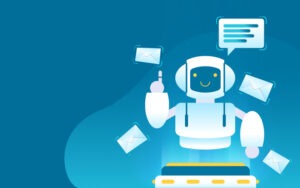Are you ready to level up your e-commerce marketing?
If you’re still manually handling every aspect of your marketing, you’re likely missing out on one of the most powerful tools available today: AI-powered automation. In a world where time is money, leveraging AI in e-commerce marketing automation isn’t just an option, t’s a necessity for growth.
AI is transforming how brands interact with customers, analyze data, and optimize marketing strategies. In fact, studies show that businesses using marketing automation see an average increase in revenue of 10% or more within six to nine months. If you’re ready to boost your marketing performance and unlock new growth opportunities, AI is the key. I’ll guide you through implementing AI-powered marketing strategies for e-commerce, explore the benefits of automation, and show you how to get started today.
1. Why E-Commerce Marketing Automation is the Future
Let’s face it, managing e-commerce marketing can be overwhelming. From creating personalized content to running campaigns, analyzing data, and responding to customer inquiries, there’s a lot to juggle. Enter AI-powered marketing automation: the solution that simplifies these processes and frees up your time to focus on scaling your business.
AI is designed to handle repetitive tasks, streamline marketing efforts, and improve efficiency. Whether it’s personalizing customer communications, optimizing ad campaigns, or automating customer support, AI can help you achieve better results in less time.
Research shows that AI-powered marketing automation can help businesses increase efficiency by up to 30%. This is because AI uses data to make smarter decisions, improving targeting and overall performance. The result? A more efficient marketing operation and increased sales.
2. How AI Improves Customer Experience Through Personalization
When it comes to e-commerce, one-size-fits-all marketing simply doesn’t work. Customers expect personalized experiences that speak to their unique needs and preferences. AI-powered marketing automation can help deliver just that.
AI can analyze vast amounts of customer data, including browsing habits, purchase history, and interactions with your website, to predict and recommend products or content that align with their interests. This allows you to send tailored offers, create personalized shopping experiences, and send emails that feel more relevant to each individual customer.
For example, if a customer recently purchased a pair of shoes, AI can automatically suggest matching accessories or clothing that would complement the purchase. This level of personalization increases the likelihood of repeat purchases and improves customer loyalty.
Personalized marketing not only boosts conversion rates but also enhances customer satisfaction. When customers feel like you understand their needs, they’re more likely to engage with your brand and become long-term advocates.
3. Using AI for Smarter Email Marketing Campaigns

Email marketing remains one of the most effective strategies for driving sales in e-commerce. But crafting the perfect email can be time-consuming and difficult to scale. AI-powered marketing automation can take your email campaigns to the next level by personalizing messages and optimizing send times. AI tools can segment your email list based on customer behavior and preferences, ensuring that each recipient receives the most relevant content.
For example, AI can trigger an abandoned cart email to a customer who left items in their cart, or send a special promotion to customers who haven’t made a purchase in a while.
AI can also determine the best time to send emails, ensuring that they land in your customers’ inboxes when they’re most likely to engage. By automating these tasks, you can ensure that every email feels personal, relevant, and timely, without having to manually create each one.
4. Automating Customer Service: Chatbots and AI Assistants
In today’s e-commerce landscape, providing fast, efficient customer service is essential. However, managing customer inquiries around the clock can be a daunting task. That’s where AI-driven chatbots and assistants come into play.
AI chatbots are capable of handling a wide range of customer queries, from order tracking to product recommendations and FAQs. These bots can interact with customers in real time, providing instant responses and freeing up your team to handle more complex issues.
The beauty of AI customer service lies in its scalability. Chatbots can be active 24/7, ensuring that your customers receive support whenever they need it. Plus, they can handle hundreds, if not thousands, of conversations simultaneously, which is something no human customer service agent can do.
This level of automation improves customer satisfaction, reduces response times, and ensures a seamless experience across all touchpoints of your e-commerce store. And as the AI system continues to learn, it becomes even better at providing relevant solutions and anticipating customer needs.
5. Optimizing Advertising with AI-Driven Campaigns
Running effective paid ad campaigns can be challenging, especially when you’re trying to balance budget constraints with performance goals. AI-powered marketing automation tools can help optimize your advertising strategy by analyzing vast amounts of data to target the right audience at the right time.
For instance, AI can analyze customer behavior, demographics, and purchase history to identify high-converting customer segments. From there, AI can automatically adjust bids, ad placements, and targeting to maximize ad performance. This means that your advertising dollars are spent more efficiently, reaching customers who are most likely to convert.
Furthermore, AI can optimize creative elements, such as ad copy and images, based on past performance data. It can test different variations of ads and automatically serve the best-performing versions to maximize your ROI.
This level of optimization allows you to get the most out of your ad budget while increasing your conversion rates and sales.
6. AI for Inventory and Demand Forecasting

One of the biggest challenges in e-commerce is managing inventory levels. Over-ordering can lead to excess stock and storage fees, while under-ordering can result in missed sales and dissatisfied customers. AI-powered demand forecasting can help you navigate this challenge.
AI tools can analyze historical sales data, market trends, and even external factors like weather or holidays to predict future demand for your products. This allows you to optimize your inventory and ensure that you’re stocked with the right products at the right time.
Additionally, AI can help with dynamic pricing, adjusting prices based on demand, competition, and other factors. This ensures that you remain competitive while maximizing your profits.
By automating inventory and demand forecasting with AI, you can reduce the risk of stockouts and overstocking, improve supply chain efficiency, and boost profitability.
7. Implementing AI-Powered Marketing Strategies: Where to Start
So, how do you start implementing AI-powered marketing strategies in e-commerce? Here’s a simple roadmap to get you started:
a. Assess Your Needs: Begin by evaluating which aspects of your marketing can benefit most from automation. Whether it’s email campaigns, customer service, or paid ads, identify the areas where AI can save you time and improve efficiency.
b. Choose the Right AI Tools: There are plenty of AI-powered marketing tools available for e-commerce businesses. Some popular options include Klaviyo for email marketing, Drift for chatbots, and AdRoll for AI-driven advertising campaigns. Choose the tools that align with your business goals and budget.
c. Start Small: You don’t need to automate everything at once. Start by automating one or two areas of your marketing, such as email personalization or chatbots, and gradually expand as you become more comfortable with the technology.
d. Monitor and Optimize: AI tools learn over time, but they still require human oversight. Monitor your campaigns, track performance metrics, and make adjustments as needed to ensure the best results.
AI-powered marketing automation isn’t just a trend, it’s the future of e-commerce. By leveraging AI, you can streamline your marketing efforts, improve customer experiences, and ultimately drive more sales. The best part? It’s not just for big businesses. With the right tools and strategies, even small e-commerce brands can implement AI to unlock growth and stay competitive in a crowded market.


3 thoughts on “Transform Your E-Commerce Growth with AI-Powered Marketing”
Comments are closed.